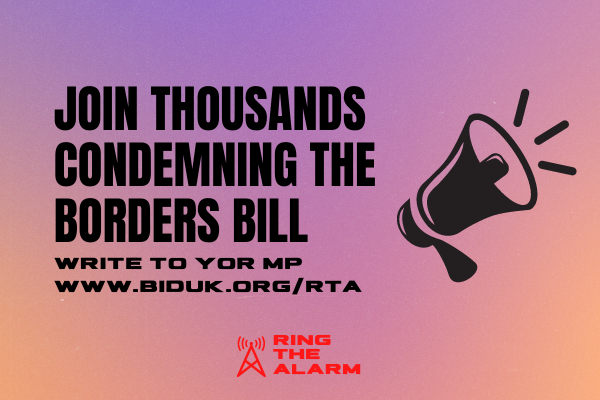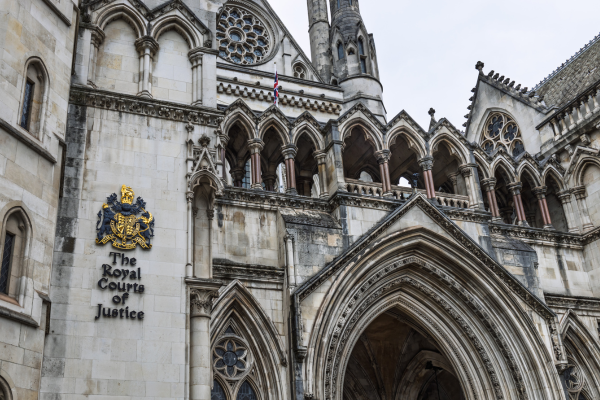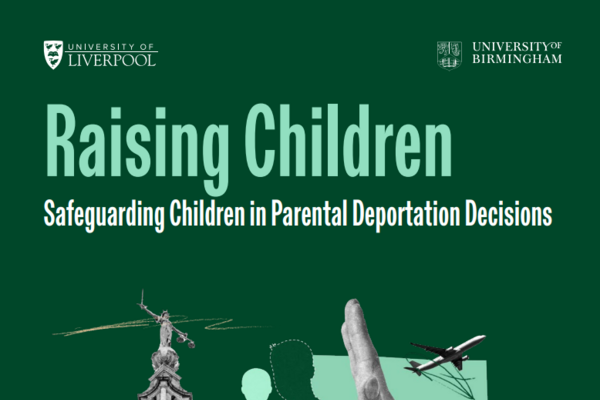As the Nationality & Borders Bill returns to the House of Commons tomorrow, join the diverse and sometimes surprising chorus of voices condemning the key principles behind this bill by emailing your MP.
Petitions about the Bill have racked up hundreds of thousands of signatures, while the Home Office themselves have admitted three-quarters of 8,590 consultation respondees opposed many of the proposals.
Below we have pulled together quotes from the broad spectrum of voices criticising the bill. Let's start with the Home Office themselves:
“The consultation has shown that there is some support for these broad ambitions, more so from members of the public. However, the responses sent into the Government consultation also show that around three quarters of those who responded said they opposed many of the policies set out in the New Plan for Immigration.” - Consultation on the New Plan for Immigration: Government Response
Plus, their own Equality Impact Assessment flagged the proposals could encourage people to take risker routes:
"There is a risk that increased security and deterrence could encourage these cohorts to attempt riskier means of entering the UK. However, deploying these measures does advance the legitimate aim of encouraging asylum seekers to claim in the first safe country they reach and not undertaking dangerous journeys facilitated by smugglers to get to the UK, though evidence supporting the effectiveness of this approach is limited.”
Thankfully the UN Refugee Agency called them out on contradicting their stated aim:
"the Bill undermines the 1951 Refugee Convention, the agreement which has protected refugees for decades and of which the UK is a signatory. At the same time, if implemented, the policies would risk the lives and well-being of vulnerable people. UNHCR believes this Bill would undermine, not promote, the Government’s stated goal of improving protection for those at risk of persecution." - UNHCR
And they didn't stop there:
“UNHCR reiterates that the attempt to create two different classes of recognised refugees is inconsistent with the Refugee Convention and has no basis in international law”
“The Bill would also create a series of significant civil and criminal penalties that would target the majority of the refugees who will seek asylum in the United Kingdom" - UNHCR, Observations on the Nationality and Borders Bill, Bill 141, 2021-22, October 2021
“UNHCR notes that in spite of the Government’s repeated references to deterring dangerous journeys and targeting criminal gangs, few of the Bill’s punitive provisions are clearly related to the safety of a refugee’s journey or how it was facilitated. Instead, they focus on punishing the asylum-seekers themselves”. - UNHCR, Updated Observations on the Nationality and Borders Bill, as amended, January 2022
UN Human Rights Expert Siobhán Mullally, the UN Special Rapporteur on Trafficking in Persons shared that view:
“If adopted, it would seriously undermine the protection of the human rights of trafficked persons, including children, increase risks of exploitation faced by all migrants and asylum seekers, and lead to serious human rights violations.
“The bill fails to acknowledge the Government’s obligation to ensure protection for migrant and asylum seeking children, and greatly increases risks of statelessness, in violation of international law (…)"
Parliament's Joint Committee on Human Rights have published three separate reports warning about many harmful consequences of the Bill:
“Clause 11 would allow for individuals who have been recognised as refugees to be given inferior treatment, based on the way in which they came to the UK. We consider this to be inconsistent with the UK’s obligations under the Refugee Convention (...) The proposed differential treatment also appears likely to be inconsistent with the right to private and family life (...). At a time when there is already an unprecedented backlog of asylum claims, these changes would make the asylum decision-making process longer, more complicated and open to further appeals”.
“The UK risks doing damage to the shared responsibility that underpins the Refugee Convention if it proceeds with plans for the offshore processing of asylum claims.”
“The introduction of a split and raised standard of proof for establishing a well founded fear of persecution runs contrary to well-established interpretation of the Refugee Convention and creates unnecessary additional complexity in asylum decision-making. (...) it would increase the risk of individuals being wrongly refused asylum and removed to face violations of fundamental human rights.”
“the proposal to lower the threshold for what constitutes a ‘particularly serious crime’ to any offence receiving a 12-month sentence would not be consistent with the language of Article 33(2) or with the humanitarian purpose of the Refugee Convention.”
“In the absence of clear safeguards that would restrict the use of the accelerated detained appeals process to appeals that are clearly unfounded and without merit, we consider that the process poses too great a risk of unfair decisions resulting in exposure to human rights violations”.
“The wide definition of “public order” contained with the Bill risks catching levels of behaviour that fall below what we consider to be the appropriate threshold to deprive a person of protection as a victim of slavery or human trafficking.” - Joint Committee on Human Rights “Legislative Scrutiny: Nationality and Borders Bill (Part 5)—Modern slavery Eleventh Report of Session 2021–22”
Raza Hussain QC expressed similar concerns in a 95-page legal opinion about the Bill:
“In our view, this Bill represents the biggest legal assault on international refugee law ever seen in the UK. This is because (a) the principle at the heart of the Bill is the penalisation, both criminally and administratively, of those who arrive by irregular means in the UK to claim asylum and (b) the Bill seeks to reverse a number of important decisions of the UK Courts, including at the House of Lords and Court of Appeal level, given over the last 20 years, without offering any justification for doing so. These are decisions where the Secretary of State lost the legal argument and which concern questions of international refugee law rather than domestic statutory provisions” - Joint Opinion, Nationality and Borders Bill, October 2021
The Independent Anti-Slavery Commissioner was so concerned she wrote to the Home Secretary:
“Having read the Bill, I remain concerned that plans will make the identification of victims of modern slavery harder and will create additional vulnerabilities.
I am particularly concerned about Clause 51 and the relatively low threshold for defining public order grounds which would restrict foreign nationals who have received sentences in excess of twelve months from being able to access support through the National Referral Mechanism (NRM). There is a real risk this will limit victim engagement in prosecutions and therefore significantly undermine the ability of law enforcement to bring traffickers to justice." - Dame Sara Thornton DBE QPM, Independent Anti-Slavery Commissioner
Top police chiefs were also worried about the risk the Bill poses to trafficking victims and shared this with the Independent:
“This bill introduces time limits which could be disadvantageous to people who take a long time to reconcile their position. Their disclosure can be the first step towards getting evidence from them. Without that there won’t be any judicial processes” - Chief Superintendent Paul Griffiths, president of the Police Superintendents’ Association
“This is taking a sledge-hammer to crack a nut and subsequently destroying 10 years of work that led to the Modern Slavery Act and led to us being the best in the world. They are crushing the system to punish the minority rather than save the majority” - Caroline Haughey QC, the UK’s foremost trafficking prosecutor
“It hasn’t been properly thought through. They want to make it harder for people that want to take advantage of the system, but actually it will exclude a much higher number of genuine victims. It will empower exploiters to control and coerce people” - Phil Brewer, modern slavery lead for the Metropolitan Police 2014 -2019.
So there you have it. Whether it is top police chiefs, human rights experts, or the Home Office themselves, thousands of voices have condemned the bill. Significant labour has gone into evidencing the flaws in this Bill and into raising awareness about its inhumane and cruel nature - we can only hope it has not fallen on deaf ears.
To add your voice to the call to #BinTheBill email your MP in minutes asking them to vote against the bill tomorrow.









